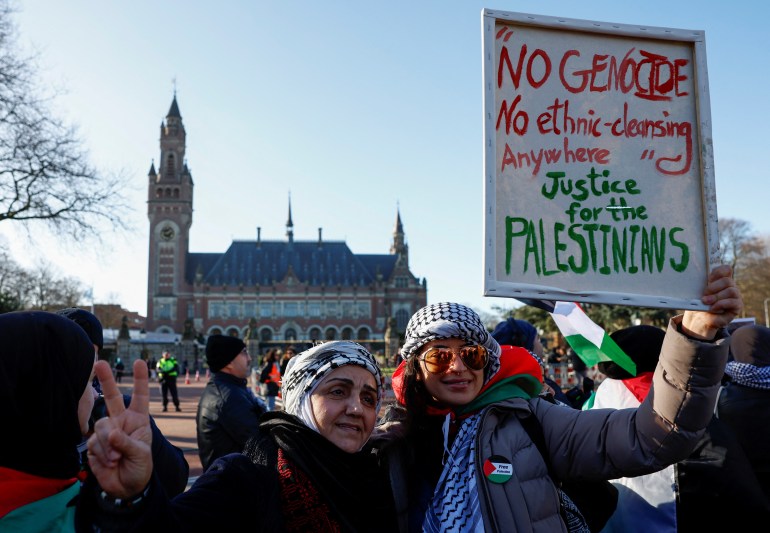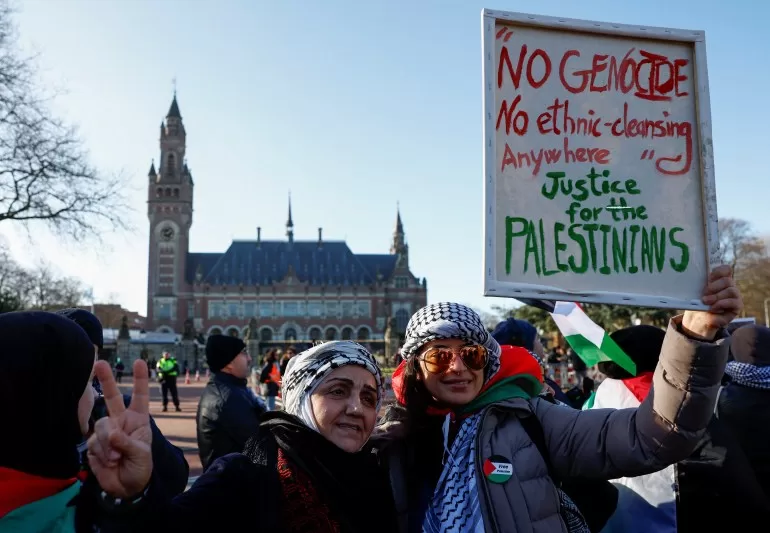In its interim ruling, the court in The Hague ordered Israel to abide by six provisional measures. Among these, the court ordered Israel to take all possible measures to prevent genocidal acts, to prevent and punish direct and public incitement to genocide, and to take immediate and effective steps to ensure the provision of basic services and humanitarian aid to civilians in Gaza.
The court also ordered Israel to preserve evidence of genocide and to submit a report to the ICJ within a month laying out how it is complying with these orders.
But on Wednesday, South Africa’s foreign minister, Naledi Pandor, said Israel has so far ignored the ruling by killing hundreds more civilians in just a few days in Gaza.
So what has Israel done to comply with the orders from the ICJ so far?

Has Israel taken measures to prevent genocidal acts?
In the week since the ICJ’s ruling, Israeli forces have continued their military offensive in Gaza, and nearly 1,000 more Palestinians have been killed.
The number of Palestinian casualties from January 26, the date of the ruling, to Thursday was 936, according to reports from the United Nations Office for the Coordination of Humanitarian Affairs (OCHA), which receives figures from Gaza’s Ministry of Health.
“Hundreds of people have been killed in the last three or four days, and clearly Israel believes it has license to do as it wishes,” Pandor said on Wednesday.
Despite the ruling, hospitals have also continued to be targeted in Israeli attacks, putting yet more strain on Gaza’s collapsing healthcare system. The Nuseirat refugee camp in central Gaza came under fire this week, and witnesses reported that tanks pounded areas of Khan Younis, particularly around Nasser Hospital, the largest hospital still functioning in southern Gaza.
Besides Nasser Hospital, Israel has continued its 11-day siege on al-Amal Hospital in Khan Younis, according to the Palestinian Red Crescent Society (PRCS), which runs it. The PRCS said Israeli forces stormed al-Amal for the third time on Thursday.
Israeli forces have denied the claims made by the PRCS. “There’s no storming of the hospital, entry into it or any ordering of people to leave at gunpoint,” an Israeli military spokesperson said on Tuesday.
Has Israel taken new controversial steps since the ICJ ruling?
On Thursday, Israeli Defence Minister Yoav Gallant made clear that Israel does not intend to cease its military operation in Gaza anytime soon. Gallant was one of three Israeli officials criticised personally by the ICJ for comments they have made that could be deemed to incite genocide against Palestinians,
In a briefing on Thursday, Gallant said Israel’s military operation in Khan Younis, which it launched last week, had been successful, clearing the way for its forces to now advance on Rafah on the enclave’s southern border with Egypt.
“We are achieving our missions in Khan Younis, and we will also reach Rafah and eliminate terror elements that threaten us,” Gallant said.
Rafah is full of internally displaced Palestinians, who are running out of places to go to within the Gaza Strip. “Thousands of Palestinians have continued to flee to the south, which is already hosting over half the population of some 2.3 million people,” Jens Laerke, a spokesperson for OCHA, said on Friday. “Rafah is a pressure cooker of despair, and we fear for what comes next.”
It is unclear where Israel intends for the people of Gaza to move to, if Rafah becomes the new epicentre of its attacks.
Meanwhile, the Israeli military this week also confirmed that it was pumping seawater into Hamas’s network of tunnels. But experts hear this could destroy Gaza’s underground water and soil, leaving the strip’s already desperate population with even less access to drinking water and agriculture opportunities. The Genocide Convention covers intentional actions calculated to bring about the physical destruction, in whole or part, of a distinct ethnic group like the Palestinians.
Has Israel punished anyone for making genocidal statements?
There has been no public announcement yet about actions Israel plans to take against Israeli ministers and officials who have made statements inciting genocide.
The genocidal rhetoric has constituted an integral part of South Africa’s case against Israel before the World Court.
Citing scriptures, Israeli Prime Minister Benjamin Netanyahu said himself in a televised address in late October: “You must remember what Amalek has done to you.” Amalekites were persecutors of the biblical Israelites, and in scriptures, God commands them to be destroyed.
Two days after the Hamas attacks on Israel on October 7, Gallant said Israel was “fighting human animals” when he announced a complete siege on Gaza.
Deputy Knesset Speaker Nissim Vaturi from Netanyahu’s Likud party wrote on X that Israelis had one common goal, “erasing the Gaza Strip from the face of the Earth”.
Israeli Heritage Minister Amichay Eliyahu from the far-right Jewish Power party suggested that Israel drop a nuclear bomb on Gaza and said there were “no uninvolved civilians” in the territory.
Rights groups and activists said such language has been left unchecked, dehumanising Palestinians and inciting violence. The statements remain unaddressed.
In fact, many government ministers, including National Security Minister Itamar Ben-Gvir and Finance Minister Bezalel Smotrich, both from far-right parties in the ruling coalition, attended a settler conference in Jerusalem last Sunday calling for Israel to rebuild settlements in Gaza and establish more in the occupied West Bank. Such a stance has been criticised as calling for the ethnic cleansing of the Palestinians.
Has Israel taken steps to ensure humanitarian aid reaches Gaza?
Since the beginning of December, aid and fuel trucks have been stranded outside the strip, blocked from entering by Israel’s siege and bombardment of the enclave. Because the bombardment has not stopped, the flow of aid continues to be hindered, humanitarian groups said.
The same day that the ICJ ordered Israel to take provisional measures to ensure that basic services and humanitarian aid can reach civilians, Israel alleged that 12 employees of the UN Relief and Works Agency for Palestine Refugees (UNRWA) had been directly involved in the Hamas attack on Israel on October 7.
Following this, the United States, United Kingdom, Germany and other major donors suspended their funding to UNRWA, which is the main humanitarian agency in Gaza providing food, shelter and medical supplies.
UNRWA and other UN agencies have warned that this could lead to UNRWA being unable to provide humanitarian services to Gaza from this month, which would plunge the enclave into starvation. No other humanitarian agency can replace UNRWA or match its services in Gaza.
Can Israel be sanctioned for noncompliance with ICJ orders?
The court’s ruling is legally binding on Israel. If it is found not to have complied with the ICJ’s orders, any member state on the UN Security Council may refer the matter to the UN’s highest decision-making body, which would then vote on whether to require Israel to abide by the provisional measures.
If it still refuses to do so, Israel could face UN sanctions, which could include economic or trade sanctions, arms embargoes and travel bans. The UN Charter also allows the Security Council to go a step further and intervene with force.
However, any sanctions may be vetoed by the US, Israel’s close ally. It has repeatedly vetoed resolutions on Israel.
Neve Gordon, an international law professor at Queen Mary University of London, told Al Jazeera that a resolution drafted by a Security Council member state might hold different weight compared with a decision made by the highest court in the world. If the US vetoes a Security Council resolution based on the ICJ decision “it will expose the duplicity of the US like no other veto before,” Gordon said.
Israel continues to assert that it is targeting Hamas and acting in self-defence after the October 7 attacks. The Gaza Health Ministry’s casualty count does not differentiate between combatants and civilians, but it has stated that the majority of the dead are women and children.
